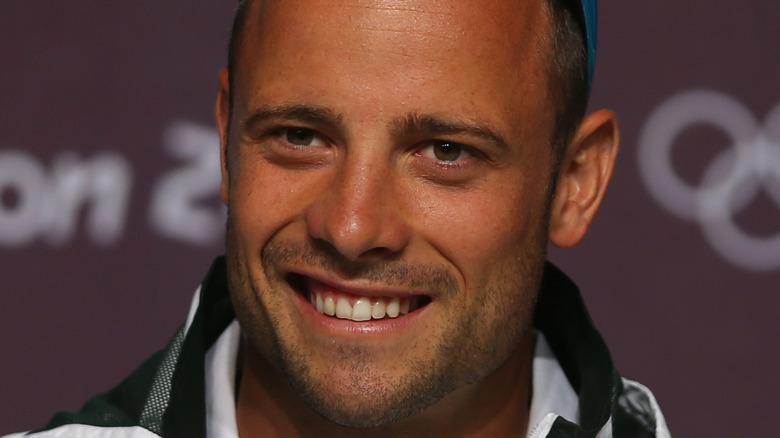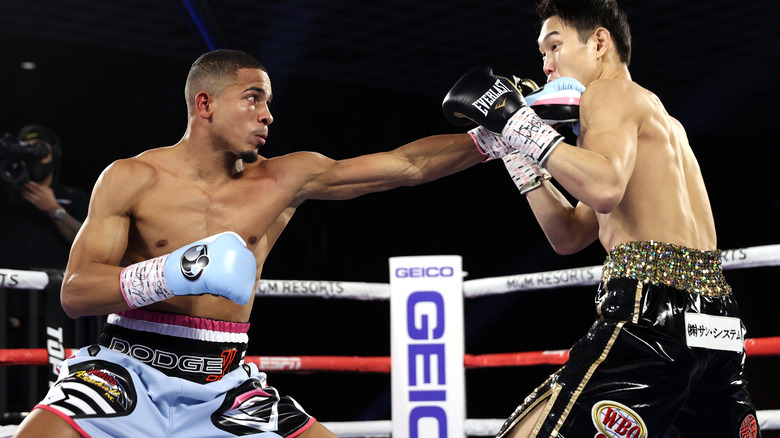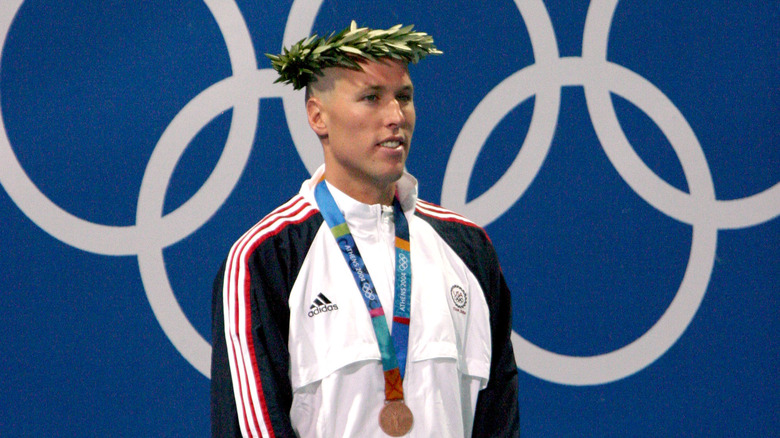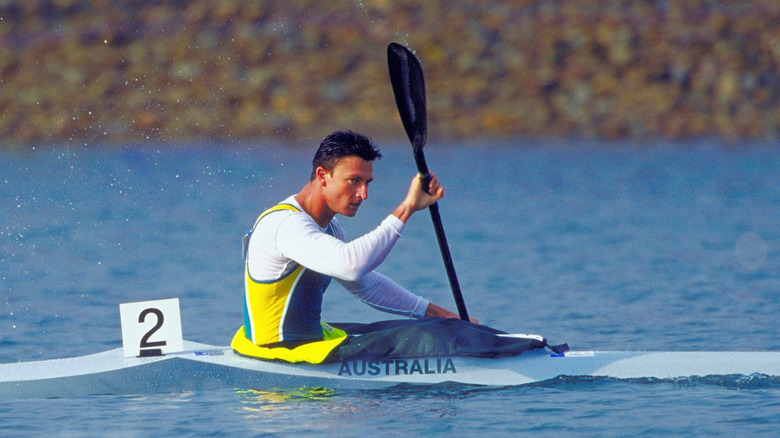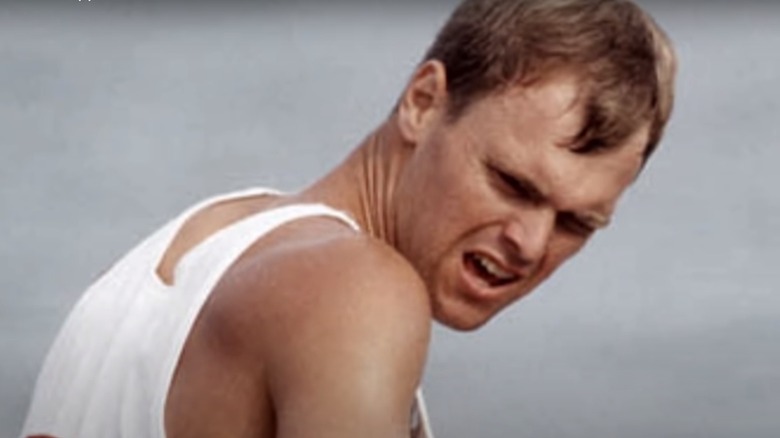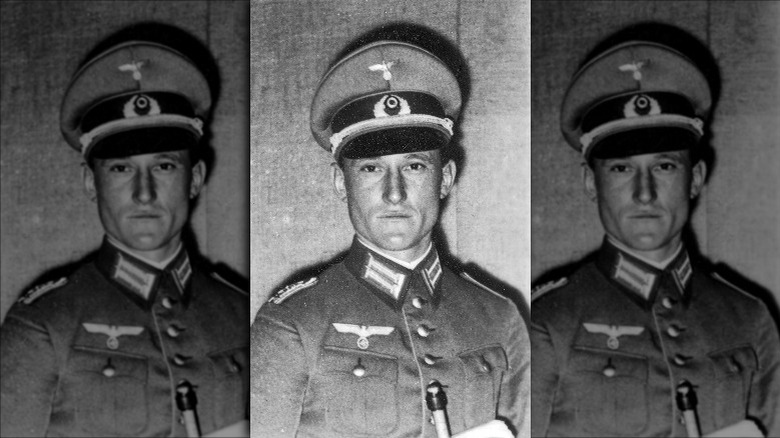Respected Olympians Who Were Actually Terrible People
While it's probably not in any of the paperwork you have to sign to compete in the Olympics, the world's most elite athletes are expected to be role models as well as really good at sports. Especially for the ones who win a medal, they are supposed to help inspire the next generation to get involved in sports.
Of course, no one is perfect. Sometimes Olympians are caught doping or revealed to be kind of a jerk. But then there are the former Olympians who take being a terrible person to the next level. These are people who commit major crimes, bringing shame on themselves, totally diminishing any achievements they had no matter how impressive, and going down in history for all the wrong reasons. This list is about those people.
However, this is by no means an exhaustive list. A worryingly large number of former Olympians have been charged with or convicted of crimes so disturbing — usually involving children — that we won't be covering them in this article. But don't worry, there are still plenty that trained their whole life for the honor of representing their country on the international stage, were applauded by millions, and then turned around and squandered all of that goodwill by being absolutely terrible.
Félix Verdejo Sánchez is facing the death penalty
Félix Verdejo Sánchez is a lightweight boxer who represented Puerto Rico at the 2012 London Olympics. (The island competes under its own flag at the Games, rather than as a part of the U.S. team.) Even though he didn't medal at the games, his professional record was only two losses out of 29 fights, so he was successful by any definition.
But in 2021, Verdejo was charged with an absolutely horrific crime. The New York Times says that he is accused of kidnapping a woman, then "punching the woman, injecting her with 'substances,' tying her body to a block and throwing her from a bridge into the water." He also allegedly shot at her once she was in the water.
While it's important to note that as of July 2021, Verdejo has not been convicted and could eventually be found not guilty, the charges are based on information from a witness who was there for the whole terrible event, plus cellular data and CCTV recordings. Oh, and the woman who was killed? She was Keishla Rodríguez, Verdejo's mistress. And she was pregnant. "I told her 'Be careful' because he had threatened her not to have the baby, that he had his family, that he is a boxer, that he is a public figure," her mother Ortiz Rivera told El Nuevo Día (via The New York Times.) The crimes he is charged with are so barbaric that Verdejo is eligible for the death penalty, although as of this writing, prosecutors have not said if they will seek it.
Scott Miller went from swimmer to drug lord
Scott Miller is an Australian who took home the silver for the 100-meter butterfly at the 1996 Summer Games in Atlanta, as well as a bronze as a member of the 4x100-meter medley relay team that same year. Outside the Olympics, he was the 1995 world champion in the 100-meter butterfly at Rio de Janeiro.
But being really good at swimming doesn't always pay the bills. However, as "Breaking Bad" showed the world, being a meth kingpin can be an extremely profitable venture. And, according to USA Today, in 2021, Scott Miller was arrested for allegedly following in Walter White's footsteps, when police found 2 million Australian dollars' ($1.6 million) worth of meth concealed in candles at his house. (Yes, this is another "allegedly," because as of this writing, Miller has not been found guilty of the charges against him, which could land him life in prison.) "The candles looked like normal candles, however they were laced with death and misery," Detective Superintendent John Watson said rather poetically at a news conference (via the Louisville Courier-Journal). "This was not a small operation," Watson also said. "They were well organized and well financed" (via USA Today).
However, this was far from the first drug arrest for Miller. In 2009, he pleaded guilty to "five charges including supplying a prohibited drug." He received 100 hours of community service, a slap on the wrist that didn't teach him anything, since he was found with large quantities of meth on him twice in two months in 2013. He got a one-year suspended sentence that time.
Klete Keller was part of the January 6th insurrection
Klete Keller was a standout swimmer for Team USA, competing at the Summer Olympics in 2000, 2004, and 2008. He was a teammate of Michael Phelps, and together they won gold as members of the 4x200-meter Freestyle Relay team in both Athens and Beijing. Keller also won a silver in the 4x200-meter Freestyle Relay in 2000 and two bronze medals in Athens and Sydney, as well.
But once he stopped competing, Keller's life went downhill. At one point he was homeless, living out of his car in Walmart parking lots, according to The Washington Post. But as of early 2021, those who knew him thought things were getting better for the former Olympian. He'd started a career in real estate and gotten engaged.
Keller's friends and acquaintances also knew he was a big Trump supporter. But they were still shocked when they saw him in video from inside the Capitol during the insurrection on January 6. (He was hard to miss: He's 6'6", wasn't wearing a mask, and, oh right, was wearing his Team USA jacket.) Members of the swimming community exchanged messages and contacted the authorities. It was a swimming website, Swimswam, that broke the story. Keller was charged with "violent entry, obstructing law enforcement, and disorderly conduct," and the next month, a grand jury added "civil disorder, obstructing an official proceeding, entering a restricted building, and disorderly conduct in a restricted building." The charges could mean 30 years or more behind bars.
Oscar Pistorius had a notorious fall from grace
Perhaps the most notorious fall from grace of any Olympian was that of Oscar Pistorius. Born missing parts of his feet and lower legs, his legs were amputated below the knee before he was a year old, according to Wired. Per the International Paralympic Committee, Pistorius took home eight medals — six of them gold — across three Paralympic games in 2004, 2008, and 2012. He made history in 2012 as well, becoming the only the third Paralympian to compete against able-bodied athletes at the London Olympics. Other accomplishments include setting a world record and being named one of Time Magazine's 100 Most Influential People in the World twice.
Then he murdered his girlfriend.
Biography quotes a South African judge who called it "human tragedy of Shakespearean proportions." Reeva Steenkamp had only been dating the Olympian for three months when she locked herself in the bathroom at Pistorius' house, and he fired four shots through the door, killing her.
What followed was a ridiculous mix of trials and retrials. Pistorius' defense was that he woke up, heard noises, and fired his gun because he thought it was an intruder. This explanation fell apart when neighbors testified they had heard the couple screaming at each other right before the gunshots. Still, his first trial in 2014 resulted in only a five-year sentence, and a second one in 2016 replaced that with a six-year sentence, until finally the South African Supreme court got involved in 2017 and handed down 13 years and five months behind bars.
Luka Klasinc tried to steal taxpayers' money
Don't worry, the Winter Olympics turn out terrible people, too. Luka Klasinc represented Slovenia in the Men's Singles Figure Skating event at the 1992 Albertville Olympics, where he came in 26th. After his career ended, he started a company that put on "ice-themed amusement park style events."
According to the Daily Beast, in 2021, Klasinc was charged with "bank fraud and aggravated identity theft" for trying to scam almost $1.5 million out of the relief fund the U.S. set up for struggling small businesses during the COVID-19 pandemic. Because this crime involved paperwork and banks and the government, it's kind of hard to understand the details of what exactly happened. Fortunately, the U.S. Attorney for the Southern District of New York laid it out in a statement (via The Hill): "As alleged, at a time when U.S. small businesses were struggling because of the pandemic, Klasinc thought he could scam his way to easy money. As alleged, Klasinc used false documents to try and obtain over a million dollars in funds intended to help hard working Americans but, thanks to the diligence of the FBI, his plans have been put on ice. He will now be held accountable for his alleged brazen lies."
As you can tell by the various uses of "alleged" in that statement, this is another crime where the accused has not been found guilty as of this writing. But if he did try to steal $1.6 million of taxpayer's money that should have gone to small businesses in need, that is super uncool.
Sushil Kumar is charged with murder
When noting that wrestler Sushil Kumar will miss the delayed 2020 Tokyo Olympics, ESPN called him "arguably India's greatest Olympian." He's the only person from his country to win individual medals in two different Olympic Games: a bronze at Beijing in 2008 and a silver four years later in London. (He also competed in the 2004 Athens Games but didn't medal.)
So why won't Kumar make Tokyo? Because he's in prison. Awaiting trial and charged with killing a guy. According to India Today, he was the instigator in a fight that saw three men, fellow wrestlers at an academy in Delhi, beaten so badly that one of them died. Then Kumar went on the run across India for three weeks. The fight is thought to have been over a Ukrainian woman. (Also, one of the injured victims is the nephew of a notorious gangster, because why not.)
While this is only an alleged crime as of 2021, since Kumar hasn't been convicted yet, it sounds like a pretty slam-dunk case for the prosecution. On top of fleeing after the incident, one police officer said (via the BBC), "We have recorded statements of all the victims and they all made allegations against Sushil Kumar." The former Olympian's lawyers accused the police of bias, but if anything, their bias might be towards the wrestler, as a viral photo showed a group of cops posing with Kumar after his arrest, wide smiles on all their faces.
Nathan Baggaley didn't know when to stop
Australian Olympic kayaker Nathan Baggaley took home two silver medals at the 2004 Athens Games. But shortly after that, it seems, he decided his real calling was drugs. Just, so many illegal drugs. First, he tested positive for steroids in 2005 and was hit with a 15-month suspension. While he said he would aim to be back for 2008 in Beijing, his drug business got in the way. The Brisbane Times details how in 2007, Baggaley was found with 800 ecstasy tabs in his car, plus some weed and cash. In 2009, he was jailed for his involvement in an ecstasy manufacturing ring. In 2012, he got in trouble for 84 ecstasy tablets and pill press components. Not slowing down, 2015 saw a charge of operating a large drug ring.
But 2018 was Baggaley's pièce de resistance. With his brother (who had been involved in most of the other crimes as well), he tried to get 650 kilos of cocaine, worth over A$200 million ($150 million), into the country, according to the New York Daily News. Baggaley bought a speedboat and instructed his brother and another man to go 200 miles off the coast and pick up the drugs. Unfortunately for them, the pair was caught by the naval authorities. The men tried to get away, speeding off in the boat and throwing kilos of cocaine into the ocean as they went.
Baggaley was convicted in 2021 and, as of this writing, is awaiting sentence.
Harold Backer ran a pyramid scheme, then disappeared
While Canadian rower Harold Backer never medaled in the Olympics, he did make it to three Games, in 1984, 1988, and 1992. But crimes he committed after he left his rowing career behind are much more impressive. If there was a Crime Olympics, surely he would finally get on the medal podium.
The well-educated Backer became an investment broker, and though The Washington Post says he lived modestly, he seemed successful. On November 3, 2015, Backer put on his cycling clothes, grabbed a backpack, and told his wife he was going on a bike ride. He never came home. Of course, family and friends started searching for him.
But things took a turn when clients of his received a letter explaining that his business was a pyramid scheme, paying off old investors with money from new ones. He'd lost his clients millions. While in the letter he claimed, "If admitting to fraud would help restore the losses, I would accept the criminal penalty," it ran pretty hollow since he'd run away from the problem. And who were the investors he'd bilked? Friends, athletes, and coaches he met when he was a rower, and even his own brother. Some were financially ruined.
No one saw him for almost 18 months, until Backer unexpectedly turned himself in at a police station in April 2017. In 2018, he pleaded guilty to fraud and was sentenced to 13 months.
David Jenkins did not get his comeuppance
Known as "The Flying Scot," Sports Reference records that David Jenkins competed in three Olympics for Great Britain, winning the silver in the 4x400-meter relay with his team at Munich 1972, as well as making the individual 400-meter finals at Montreal 1976 and Moscow 1980, although he finished 7th in both of those appearances. Between his two final Olympics, he was often injured, and it was surprising when he managed to be fit enough to go to Moscow. Apropos of nothing, no athletes were actually drug tested at the Moscow games.
Seven years later, after Jenkins had retired and moved to California, he was busted for his new job: making and smuggling an absolute poop-load of illegal steroids. He was one of the main guys behind a facility in Mexico that made the drugs and then trafficked them into the U.S. Okay, but how much steroids could we really be talking about here? Could you believe 70%? Yes, at one point, Jenkins and his crew were behind more than two-thirds of all the illegal steroids in the U.S. Jenkins also admitted he'd used steroids later in his running career, which puts his amazing recovery for the Moscow Games in a different light.
Jenkins was sentenced to seven years for his crimes but only ended up serving nine months. When he got out, he set up a supplement company with another convicted drug felon and is now thought to be worth millions. That's ... karma for you?
Lots of German athletes went on to be Nazis
The 1936 Berlin Olympics were famously controversial, as Adolph Hitler tried to use them to show off how great both Nazi Germany and the Aryan race were. While he was embarrassed by Jesse Owens, overall, the Germany team dominated the medal table, winning 89 medals, 33 of them gold.
Since World War II started just three years later, and since young, athletic men are the military's bread and butter, many of these athletes ended up fighting for the Nazis. Take Hermann Leopold August von Oppeln-Bronikowski, who won gold with the German Dressage team in 1936, according to WW2 Gravestone. He went on to command Panzer divisions during the war, winning many medals and accolades.
Heinz Brandt (pictured) won a gold medal in Berlin with the German Show Jumping team, per the official Olympics website. Then, during the war, by complete chance, he ended up saving Hitler's life. That has to count as something pretty terrible, even if he didn't mean to, right? Brandt was in the room for the most famous attempt on Hitler's life, when his own officers placed a bomb hidden in a suitcase next to the Führer's chair. Had it stayed there, it almost certainly would have killed him and changed the course of history. But Brandt, finding the suitcase in his way, moved it behind a large, sturdy table leg. When the bomb went off, Hitler was not harmed, although Brandt would die of his own injuries the next day.
Lance Armstrong was a cheating phenomenon
Not too many people would be shocked to know that Lance Armstrong was revealed to be just the absolute worst, but they might be surprised to know he was an Olympian, and a medalist at that. Despite being most famous for his domination of the Tour de France, according to ESPN, the cyclist also competed in the 1996 Atlanta Games, where his highest placement was 6th, and the 2000 Sydney Olympics, where he got a bronze in the time trials. In between the two Games, he'd gotten cancer, which made it all the more impressive. Seemingly, anyway.
Sure, plenty of Olympic athletes could make this list for doping, except that compared to murders and crimes of that nature, doping seems a bit tame. But Lance Armstrong didn't just dope a little, and he didn't just dope on his own. He took the art of passing drug tests to another level, somehow producing clean urine while using essentially all the banned performance enhancers. When his crime was finally discovered, the United States Anti-Doping Agency declared in their report (via NPR) that Armstrong was a prolific doper and that he "ruthlessly" made those around him, his teammates, dope just as much. Essentially, he bullied people into risking their jobs and their health just so he could get glory.
In 2013, after Armstrong admitted his crimes to Oprah, the International Olympic Committee asked for the bronze medal back. It took him eight months to return it.
